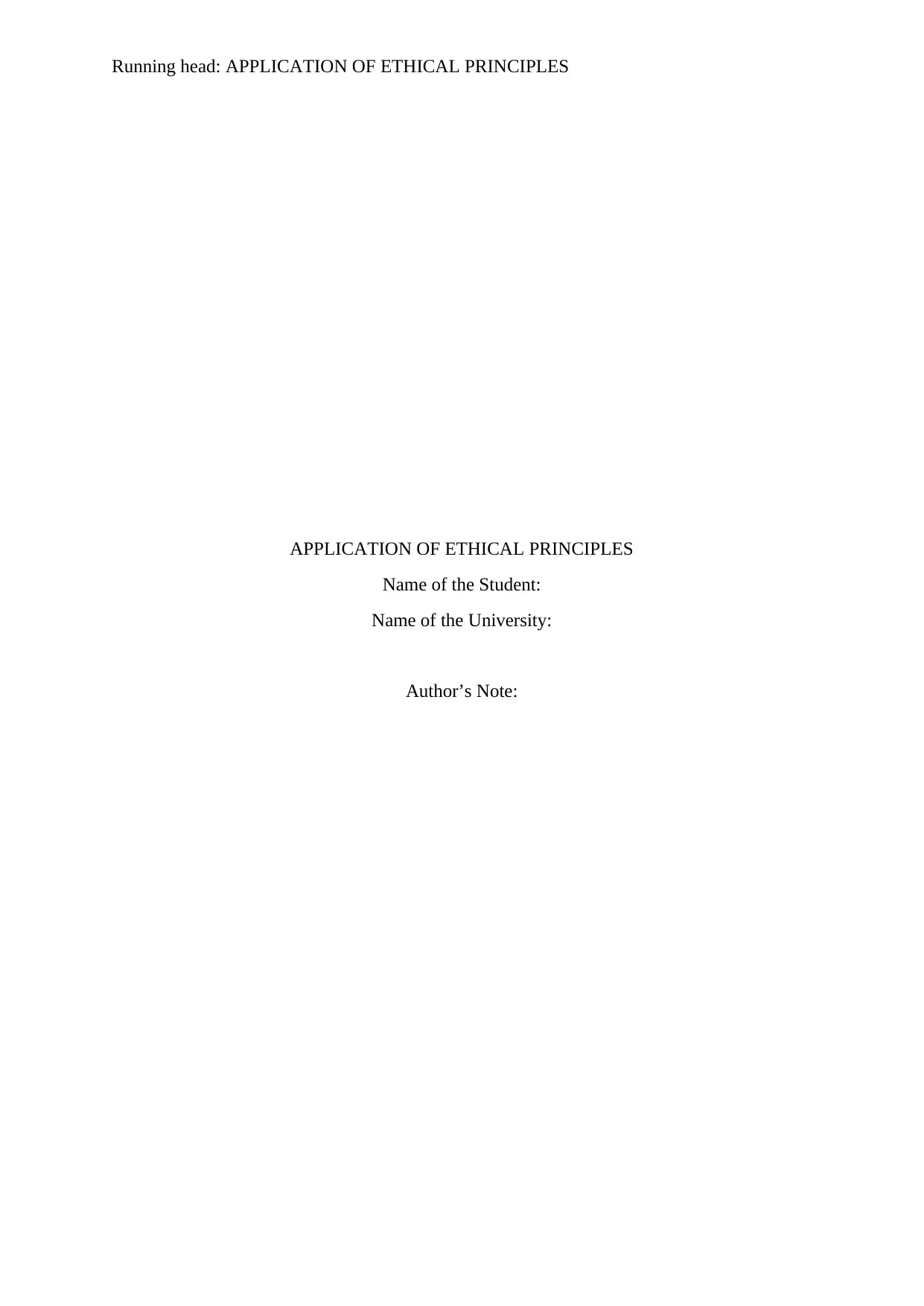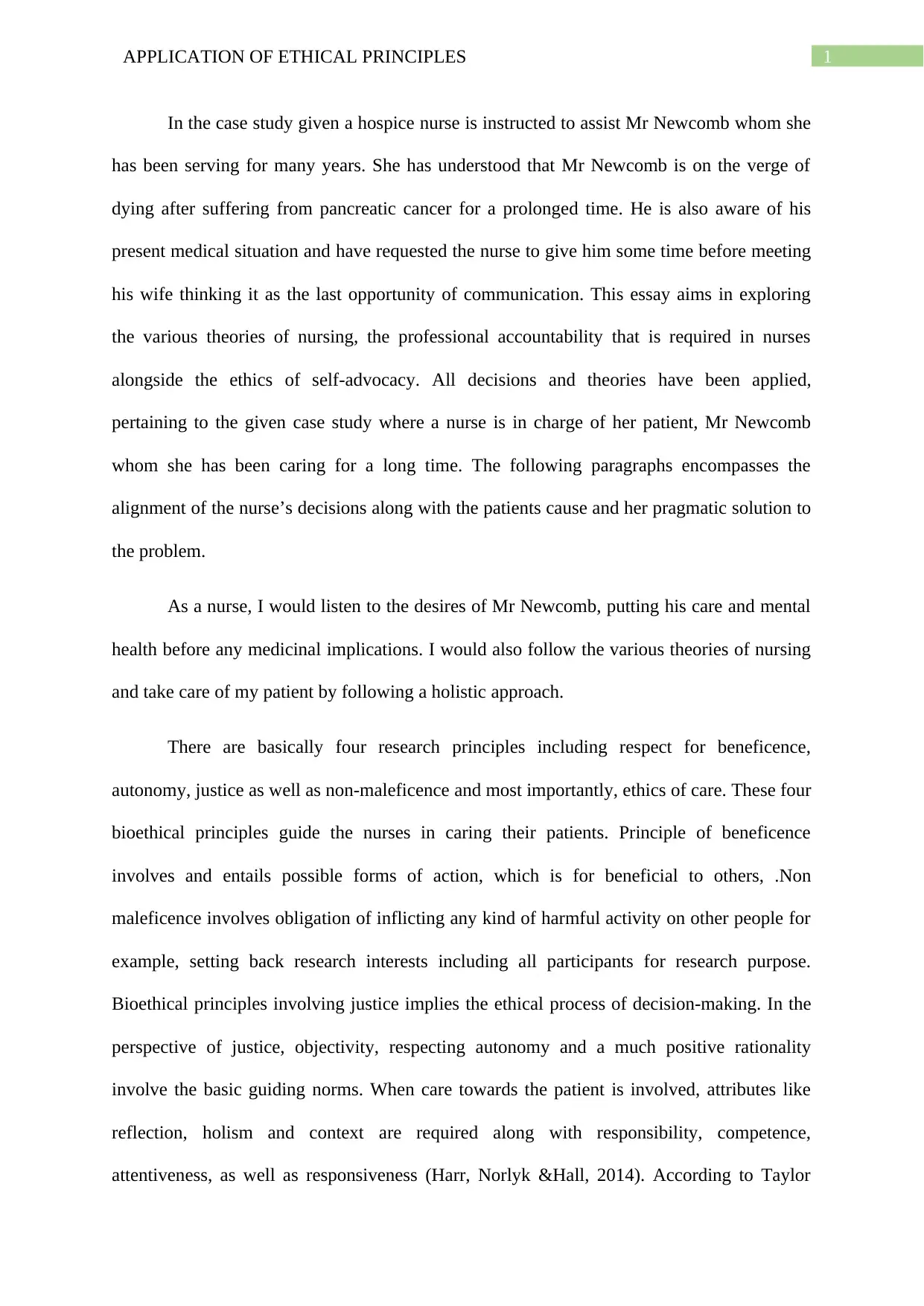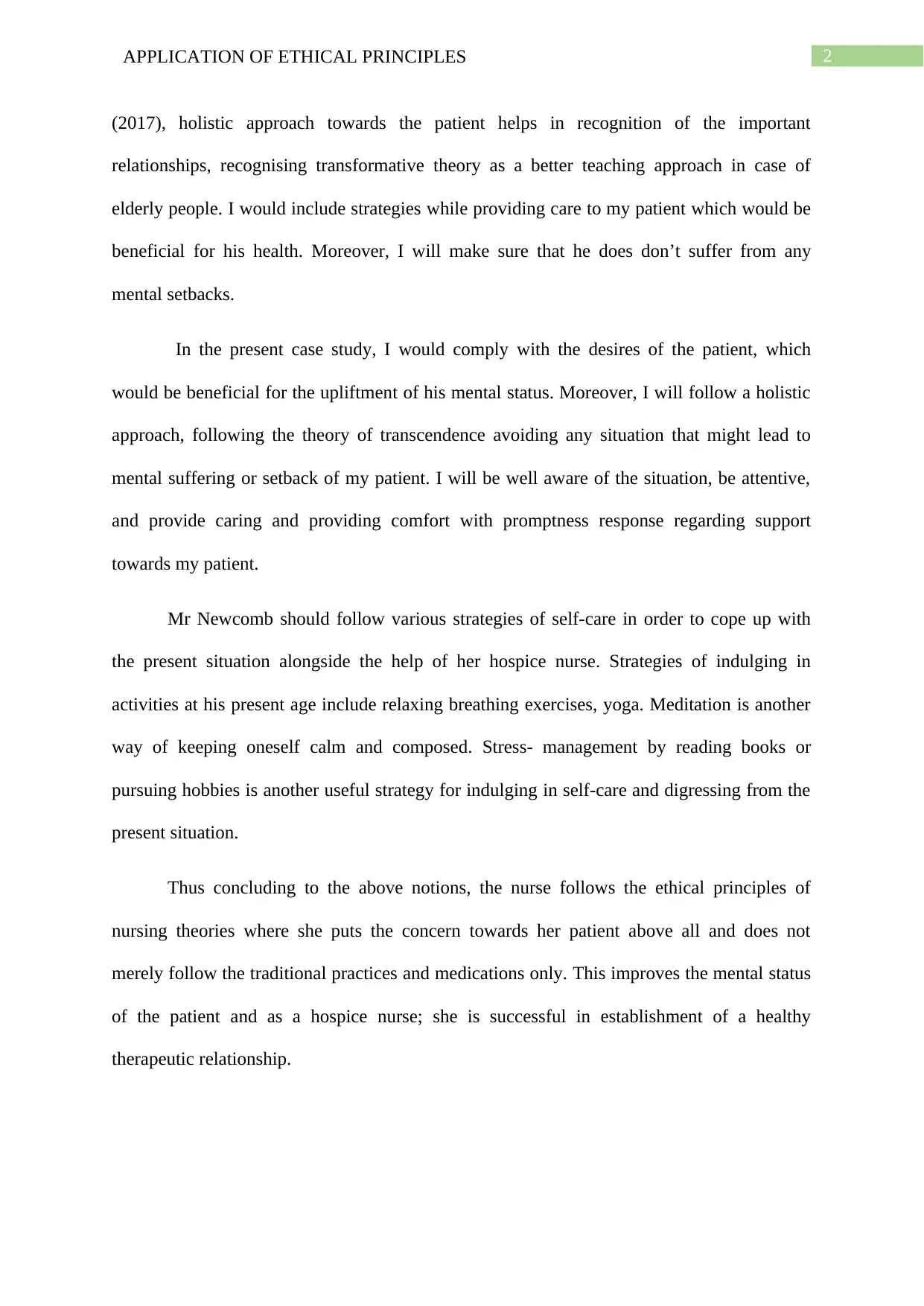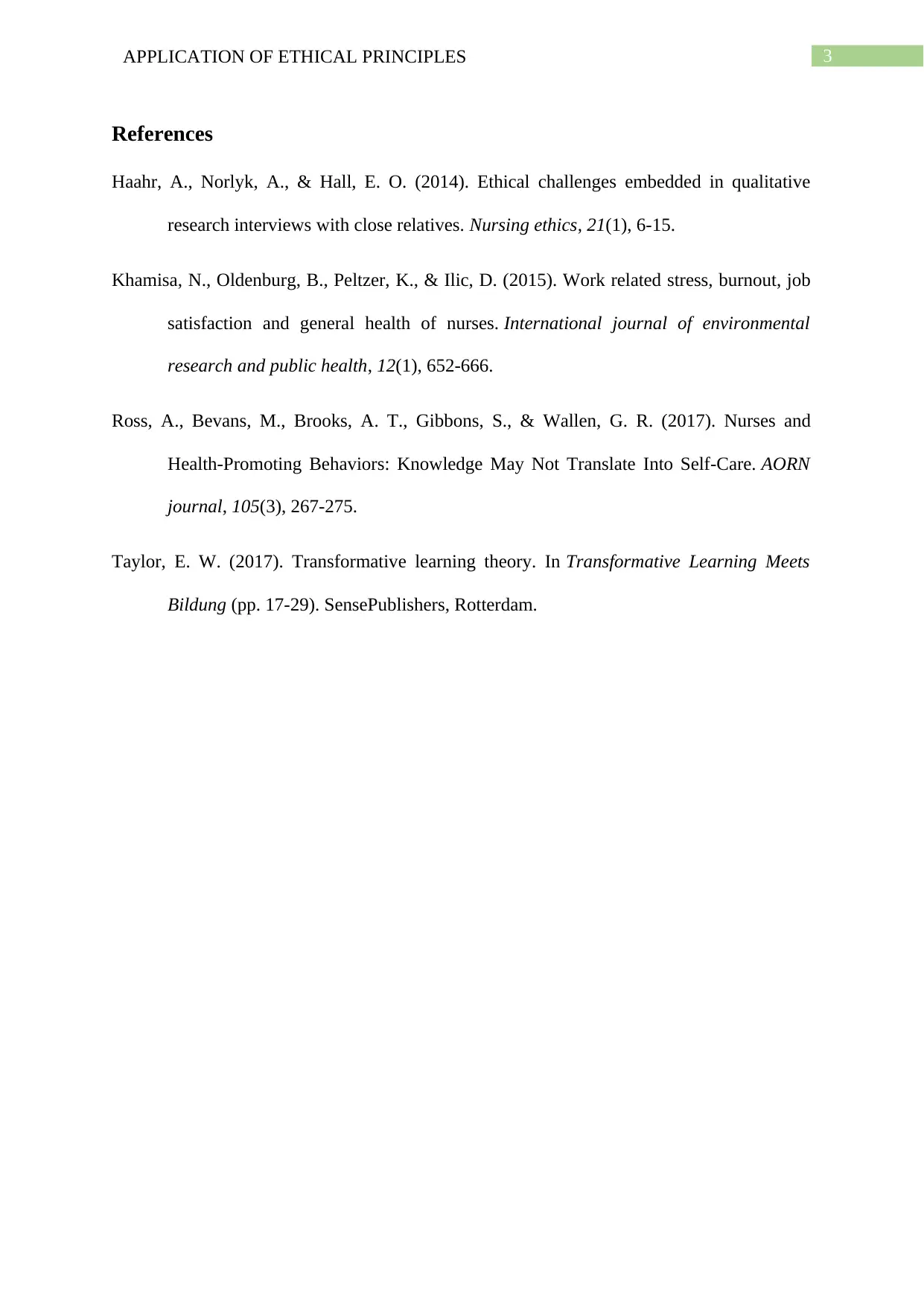University Nursing Ethics: Application of Ethical Principles
VerifiedAdded on 2023/04/22
|4
|862
|405
Essay
AI Summary
This essay analyzes a nursing case study where a hospice nurse cares for a patient, Mr. Newcomb, nearing the end of his life due to pancreatic cancer. The assignment explores the application of ethical principles, nursing theories, and professional accountability in making clinical decisions. The nurse prioritizes the patient's wishes, adhering to principles of beneficence, autonomy, justice, and non-maleficence, alongside the ethics of care. The essay emphasizes a holistic approach, incorporating transformative learning theory and self-care strategies for the patient. The nurse's actions align with ethical guidelines, fostering a therapeutic relationship. The essay references relevant research on ethical challenges, stress, and health-promoting behaviors in nursing, providing a comprehensive understanding of ethical decision-making in end-of-life care.

Running head: APPLICATION OF ETHICAL PRINCIPLES
APPLICATION OF ETHICAL PRINCIPLES
Name of the Student:
Name of the University:
Author’s Note:
APPLICATION OF ETHICAL PRINCIPLES
Name of the Student:
Name of the University:
Author’s Note:
Paraphrase This Document
Need a fresh take? Get an instant paraphrase of this document with our AI Paraphraser

1APPLICATION OF ETHICAL PRINCIPLES
In the case study given a hospice nurse is instructed to assist Mr Newcomb whom she
has been serving for many years. She has understood that Mr Newcomb is on the verge of
dying after suffering from pancreatic cancer for a prolonged time. He is also aware of his
present medical situation and have requested the nurse to give him some time before meeting
his wife thinking it as the last opportunity of communication. This essay aims in exploring
the various theories of nursing, the professional accountability that is required in nurses
alongside the ethics of self-advocacy. All decisions and theories have been applied,
pertaining to the given case study where a nurse is in charge of her patient, Mr Newcomb
whom she has been caring for a long time. The following paragraphs encompasses the
alignment of the nurse’s decisions along with the patients cause and her pragmatic solution to
the problem.
As a nurse, I would listen to the desires of Mr Newcomb, putting his care and mental
health before any medicinal implications. I would also follow the various theories of nursing
and take care of my patient by following a holistic approach.
There are basically four research principles including respect for beneficence,
autonomy, justice as well as non-maleficence and most importantly, ethics of care. These four
bioethical principles guide the nurses in caring their patients. Principle of beneficence
involves and entails possible forms of action, which is for beneficial to others, .Non
maleficence involves obligation of inflicting any kind of harmful activity on other people for
example, setting back research interests including all participants for research purpose.
Bioethical principles involving justice implies the ethical process of decision-making. In the
perspective of justice, objectivity, respecting autonomy and a much positive rationality
involve the basic guiding norms. When care towards the patient is involved, attributes like
reflection, holism and context are required along with responsibility, competence,
attentiveness, as well as responsiveness (Harr, Norlyk &Hall, 2014). According to Taylor
In the case study given a hospice nurse is instructed to assist Mr Newcomb whom she
has been serving for many years. She has understood that Mr Newcomb is on the verge of
dying after suffering from pancreatic cancer for a prolonged time. He is also aware of his
present medical situation and have requested the nurse to give him some time before meeting
his wife thinking it as the last opportunity of communication. This essay aims in exploring
the various theories of nursing, the professional accountability that is required in nurses
alongside the ethics of self-advocacy. All decisions and theories have been applied,
pertaining to the given case study where a nurse is in charge of her patient, Mr Newcomb
whom she has been caring for a long time. The following paragraphs encompasses the
alignment of the nurse’s decisions along with the patients cause and her pragmatic solution to
the problem.
As a nurse, I would listen to the desires of Mr Newcomb, putting his care and mental
health before any medicinal implications. I would also follow the various theories of nursing
and take care of my patient by following a holistic approach.
There are basically four research principles including respect for beneficence,
autonomy, justice as well as non-maleficence and most importantly, ethics of care. These four
bioethical principles guide the nurses in caring their patients. Principle of beneficence
involves and entails possible forms of action, which is for beneficial to others, .Non
maleficence involves obligation of inflicting any kind of harmful activity on other people for
example, setting back research interests including all participants for research purpose.
Bioethical principles involving justice implies the ethical process of decision-making. In the
perspective of justice, objectivity, respecting autonomy and a much positive rationality
involve the basic guiding norms. When care towards the patient is involved, attributes like
reflection, holism and context are required along with responsibility, competence,
attentiveness, as well as responsiveness (Harr, Norlyk &Hall, 2014). According to Taylor

2APPLICATION OF ETHICAL PRINCIPLES
(2017), holistic approach towards the patient helps in recognition of the important
relationships, recognising transformative theory as a better teaching approach in case of
elderly people. I would include strategies while providing care to my patient which would be
beneficial for his health. Moreover, I will make sure that he does don’t suffer from any
mental setbacks.
In the present case study, I would comply with the desires of the patient, which
would be beneficial for the upliftment of his mental status. Moreover, I will follow a holistic
approach, following the theory of transcendence avoiding any situation that might lead to
mental suffering or setback of my patient. I will be well aware of the situation, be attentive,
and provide caring and providing comfort with promptness response regarding support
towards my patient.
Mr Newcomb should follow various strategies of self-care in order to cope up with
the present situation alongside the help of her hospice nurse. Strategies of indulging in
activities at his present age include relaxing breathing exercises, yoga. Meditation is another
way of keeping oneself calm and composed. Stress- management by reading books or
pursuing hobbies is another useful strategy for indulging in self-care and digressing from the
present situation.
Thus concluding to the above notions, the nurse follows the ethical principles of
nursing theories where she puts the concern towards her patient above all and does not
merely follow the traditional practices and medications only. This improves the mental status
of the patient and as a hospice nurse; she is successful in establishment of a healthy
therapeutic relationship.
(2017), holistic approach towards the patient helps in recognition of the important
relationships, recognising transformative theory as a better teaching approach in case of
elderly people. I would include strategies while providing care to my patient which would be
beneficial for his health. Moreover, I will make sure that he does don’t suffer from any
mental setbacks.
In the present case study, I would comply with the desires of the patient, which
would be beneficial for the upliftment of his mental status. Moreover, I will follow a holistic
approach, following the theory of transcendence avoiding any situation that might lead to
mental suffering or setback of my patient. I will be well aware of the situation, be attentive,
and provide caring and providing comfort with promptness response regarding support
towards my patient.
Mr Newcomb should follow various strategies of self-care in order to cope up with
the present situation alongside the help of her hospice nurse. Strategies of indulging in
activities at his present age include relaxing breathing exercises, yoga. Meditation is another
way of keeping oneself calm and composed. Stress- management by reading books or
pursuing hobbies is another useful strategy for indulging in self-care and digressing from the
present situation.
Thus concluding to the above notions, the nurse follows the ethical principles of
nursing theories where she puts the concern towards her patient above all and does not
merely follow the traditional practices and medications only. This improves the mental status
of the patient and as a hospice nurse; she is successful in establishment of a healthy
therapeutic relationship.
⊘ This is a preview!⊘
Do you want full access?
Subscribe today to unlock all pages.

Trusted by 1+ million students worldwide

3APPLICATION OF ETHICAL PRINCIPLES
References
Haahr, A., Norlyk, A., & Hall, E. O. (2014). Ethical challenges embedded in qualitative
research interviews with close relatives. Nursing ethics, 21(1), 6-15.
Khamisa, N., Oldenburg, B., Peltzer, K., & Ilic, D. (2015). Work related stress, burnout, job
satisfaction and general health of nurses. International journal of environmental
research and public health, 12(1), 652-666.
Ross, A., Bevans, M., Brooks, A. T., Gibbons, S., & Wallen, G. R. (2017). Nurses and
Health‐Promoting Behaviors: Knowledge May Not Translate Into Self‐Care. AORN
journal, 105(3), 267-275.
Taylor, E. W. (2017). Transformative learning theory. In Transformative Learning Meets
Bildung (pp. 17-29). SensePublishers, Rotterdam.
References
Haahr, A., Norlyk, A., & Hall, E. O. (2014). Ethical challenges embedded in qualitative
research interviews with close relatives. Nursing ethics, 21(1), 6-15.
Khamisa, N., Oldenburg, B., Peltzer, K., & Ilic, D. (2015). Work related stress, burnout, job
satisfaction and general health of nurses. International journal of environmental
research and public health, 12(1), 652-666.
Ross, A., Bevans, M., Brooks, A. T., Gibbons, S., & Wallen, G. R. (2017). Nurses and
Health‐Promoting Behaviors: Knowledge May Not Translate Into Self‐Care. AORN
journal, 105(3), 267-275.
Taylor, E. W. (2017). Transformative learning theory. In Transformative Learning Meets
Bildung (pp. 17-29). SensePublishers, Rotterdam.
1 out of 4
Related Documents
Your All-in-One AI-Powered Toolkit for Academic Success.
+13062052269
info@desklib.com
Available 24*7 on WhatsApp / Email
![[object Object]](/_next/static/media/star-bottom.7253800d.svg)
Unlock your academic potential
Copyright © 2020–2026 A2Z Services. All Rights Reserved. Developed and managed by ZUCOL.





